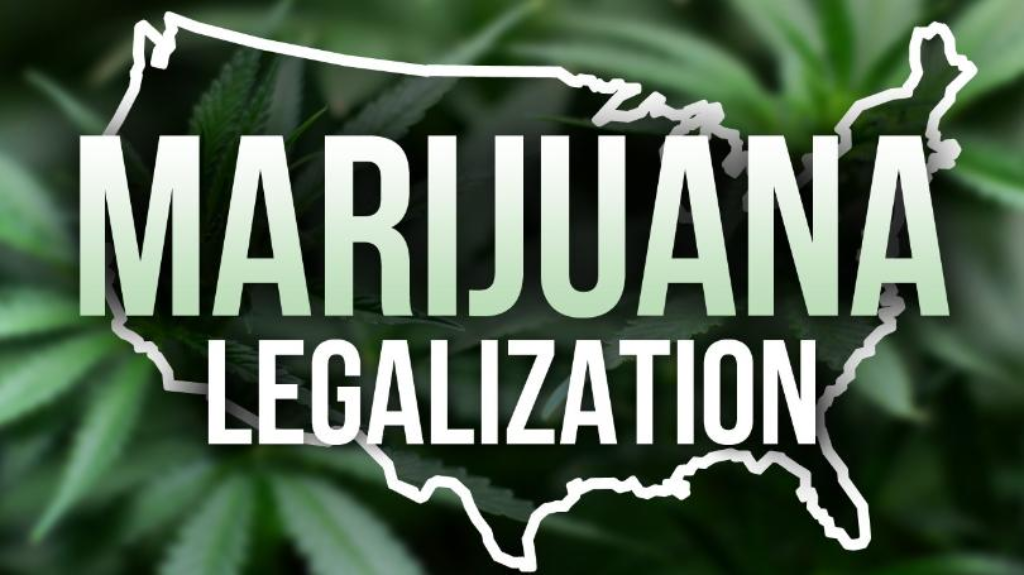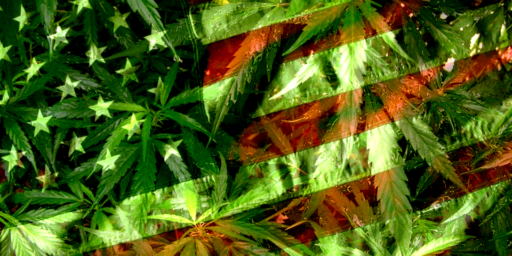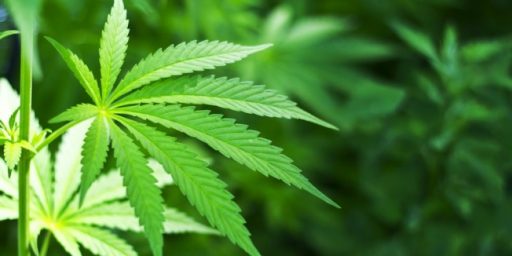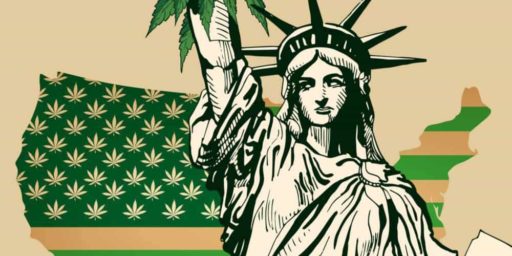North Dakota To Vote On Marijuana Legalization In November
Another step forward in the seemingly unstoppable movement toward nationwide legalization.

In November, we may be able to add North Dakota to the list of states where recreational marijuana is legal:
North Dakotans will vote this November on a ballot measure to legalize recreational marijuana, state officials announced Monday.
Secretary of State Al Jaeger said that Legalize ND, the group leading the charge to get the question on the ballot, submitted 14,637 signatures last month, about 1,200 more than required.
If passed, the ballot measure would permit “non-violent marijuana related activity” for North Dakotans aged 21 and up, according to the Grand Forks Herald.
The measure allows for unlimited possession and growth of marijuana and opens the door for the state to expunge marijuana-related criminal records.
The state voted to legalize medical weed in 2016, but it has not yet been made available to the public, as officials are still licensing dispensaries and growing facilities.
David Owen, a University of North Dakota student who is leading the measure, told the Grand Forks Herald that he is pushing for legalization as a criminal justice issue.
“Because of a plant … they are now barred for the rest of their life from ever really achieving what they could be,” he told the paper. “And that is the real crime of the war on drugs.”
Opposition to the measure is coming largely from law enforcement. The North Dakota Sheriff’s and Deputies Association passed a resolution opposing the legalization of recreational marijuana.
More from the Grand Forks Herald:
BISMARCK — North Dakotans will decide whether to legalize recreational marijuana this fall, two years after voters approved the drug’s medical use.
Secretary of State Al Jaeger said Monday, Aug. 13, the group pushing a ballot measure submitted 14,637 valid signatures last month, about 1,200 more than it needed to appear on the Nov. 6 ballot.“We expected it. I’m just glad Al Jaeger confirmed it,” said David Owen, a University of North Dakota student leading the measure campaign.
The measure would amend state law to legalize “non-violent marijuana related activity” for those over 21, except for selling to minors, and wouldn’t impose limits on the amount somebody could possess or grow. People under 21 possessing marijuana and those selling it to minors would be treated as if the substance in question was alcohol.
The measure also creates a process for expunging records of those previously convicted of a crime that’s legalized by the measure. Owen said it wouldn’t release prisoners early or affect pending cases.
Owen, who ran unsuccessfully for the Legislature as a Libertarian in 2016, said he hasn’t used marijuana but nevertheless wants to see it legalized as a matter of criminal justice reform. He argued that too many people have been incarcerated, become ineligible for student loans or paid other prices for possessing what he described as a drug that’s less harmful than alcohol and opioids.
“Because of a plant … they are now barred for the rest of their life from ever really achieving what they could be,” he said. “And that is the real crime of the war on drugs.”
Mark Friese, a former Bismarck police officer who’s now a criminal defense attorney in Fargo, was sympathetic to those arguments but said the measure is “very broadly written” and could offer new defenses for non-violent offenses involving the drug, such as paying a prostitute with marijuana. He said the expungement provision was also “inartfully drafted” and doesn’t account for someone who has another conviction alongside the marijuana offense.
“You can’t seal part of a case file, you can’t seal one charge because the charging document would have both,” Friese said, calling the language an “enormous logistical headache.”
Marijuana was the most commonly seized drug by North Dakota law enforcement last year, according to statistics from Attorney General Wayne Stenehjem’s office. Speaking to reporters while recapping the state’s latest crime statistics in June, the longtime Republican attorney general said legalizing marijuana has introduced a “host” of problems in other states, such as impaired drivers and increased pressure on treatment providers.
“I think it might just shift the law enforcement issues from one place to another,” he said. “And I have said for a long time that I don’t think that if marijuana is legalized in North Dakota we will be healthier or safer.”
The North Dakota Sheriff’s and Deputies Association has already passed a resolution opposing the legalization of recreational marijuana. Gov. Doug Burgum supports decriminalization at the federal level, his spokesman Mike Nowatzki said.
Owen said North Dakota already has a DUI law in place to deal with marijuana use and argued the measure could bring a major tax revenue boost.
(…)
Legalize ND, the group pushing the ballot measure, commissioned a poll earlier this year that found a plurality, but not a majority, of North Dakota voters supported the idea.
Erik Altieri, executive director of the pro-legalization group NORML, pointed to recent national polling showing that, for the first time, a majority of Republicans support legalization, a sign the issue could find support even in conservative states like North Dakota. Nine states and the District of Columbia have already legalized recreational marijuana, according to the National Conference of State Legislatures.
“Marijuana legalization is no longer a regional or partisan issue … and I expect North Dakota voters to send shockwaves across the country this fall when they join the growing contingent of states who have chosen the sensible path of legalization and regulation over prohibition and incarceration,” Altieri said in a statement.
The president of the anti-legalization group Smart Approaches to Marijuana, Kevin Sabet, warned of increased youth exposure to the drug and said the organization would work to defeat the measure.
In North Dakota, an estimated 9.8 percent of people ages 12 and older used marijuana in the past year, compared with 12.9 percent in Minnesota, according to the latest national survey conducted by the Substance Abuse and Mental Health Services Administration. But for 18 to 25-year-olds, that figure jumps to almost a quarter of North Dakotans and nearly a third of Minnesotans.
If the voters of the Peace Garden State do approve this referendum, then North Dakota would become the tenth state to legalize marijuana, with the prospect of several other states joining the movement in the coming months. The legalization movement began, of course, in 2012 when Colorado and Washington became the first states to legalize marijuana for recreational use through citizen initiatives that were on the November ballot that year. Four years later, similar referenda were passed in Oregon, Alaska, and the District of Columbia. The movement gained more steam in 2016 thanks to the passage of legalization ballot measures in California, Massachusetts, Nevada, and Maine while voters in a number of other states approved legalization for medicinal purposes. 2018 has seen similar progress on this issue at the state level. For example, January was the biggest month yet for the legalization movement given the fact that the most populated state in the nation, California, officially legalized marijuana based on the 2016 referendum. Last month, Vermont officially became the ninth state to legalize marijuana and the first to do so via the legislative process rather than a citizen referendum. At approximately the same time, it was announced that a legalization referendum had qualified for the November ballot in Michigan. Finally, and most recently, the Attorney General of New Jersey announced the most marijuana prosecutions would be put on hold for at least ninety days while the state legislature considers legislation promised by Governor Phil Murphy and state Democrats last year to legalize marijuana in the Garden State. This means, then, that by the end of the year marijuana could be legal, or in the process of becoming legal, in at least states. This does not include the numerous jurisdictions in which it has been effectively decriminalized in many states and at the very least legalized for medical purposes in others,
These changes in the law have, not surprisingly, been accompanied by significant changes in public opinion with regard to marijuana that seems likely to propel the legalization movement forward. The best example of that outside of the developments at the state level can be seen in the polls. For many years, of course, support for legalization was relatively low and limited to civil liberties advocates on the left and libertarians. That began to change, though, at the start of the 2010s. In 2011, for example, polling showed that support legalization had reached the 50% level, while even larger numbers supported legalization for medical purposes or decriminalization. By 2013, the number of Americans supporting complete legalization had passed the 50% mark. That mark reached 55% in 2014 and 58% in 2015. By the autumn of 2017, support for legalization had reached 64%, and most recently a poll in May showed that nearly two-thirds of Americans supported complete legalization. Similar to the polling on marriage equality that we saw in advance of the legal victories that issue began scoring in the courts, the trend seems to be rather obvious and most likely irreversible.
In addition to these poll numbers, we have seen signs from the world of politics that marijuana legalization is becoming more and more of a mainstream idea. Earlier this year, for example, former Speaker of the House John Boehner announced that he’s changed his mind on the issue of legalization and joined the board of a company that grows and sells cannabis in states where it is legal for either medical or recreational purposes. Meanwhile, in Congress, Senate Minority Leader Chuck Schumer introduced a bill that would give states freedom to set their own marijuana laws free from Federal control and to protect the citizens of those states from being charged with Federal crimes if they are acting in accordance with state law. The trend forward seems easy to see, even if it is likely to take a bit longer than some people might prefer.




I wonder what the effect will be on Heidi Heitkamp’s re-election?
@Michael Reynolds: I can’t imagine that her campaign is anything but thrilled about this (for turnout reasons) … although I also wouldn’t be surprised if she tends to try to sidestep talking too much about the issue on the campaign trail.
Oh, Wow! Stoned Norwegian bachelor farmers, cool.
I believe that Sasketchewan is a major hemp grower. Legalizing cannabis in NoDak would give farmers an alternative crop that probably has not been subjected to the tariff wars. This would be a real boon.
@Mr. Prosser:
Nowadays, it’s single (mostly white) dudes up from Texas and Louisiana working shale oil fields.
Actually a lot of NoDak is beautiful. Unlike you coastal elites, I’ve actually spent time there. The east is flat and stark. The west is bumpy and stark. Emptiness is beautiful.
The best road in the world runs through northern NoDak and Montana. That road will change your perception of what life is.
It is vast and immense.
One of saddest things ever is SYFY’s Sharknado week.
Michael Madsen was a great actor. Like De Niro great. I just watched him in some dumb-ass made for SYFY sharknado crap where he had to lean on the set to stand up. He was literally falling down on set and they allowed him to “act” in a movie that cost like 12$ to make. It was sad and humiliating.
Tom Sizemore has been granted some come-back shots and he hasn’t blown it and at times made us remember that he was a really, really good actor. When Michael Madsen squares himself away he needs another shot, because he can be really good.
In Kill Bill, outside of Sonny Chiba (obvs) and Michael Parks (revelation), Michael Madsen was the best of the lot and that was a really tight bunch. Astonishingly good. Darryl Hannah, who knew? That whole O-ren Ishii sequence was brilliance.
Madsen used to be really good and I love would to see that again.
I have a boozehound-brother and some friends who ended up as hard-core alkys. It won’t be easy, but he can beat it.
Because “Jobs” of course. They don’t give a rats ass about anything else.
@de stijl: Madsen killed it in Reservoir Dogs. That whole cast was perfect, I can’t imagine anyone else in any of the major roles.
@Michael Reynolds:
NORML’s Erik Altieri:
So maybe the answer is “very little?”
As to Michael Madsen, he’s got a little John Wayne in him: a great performer, but kind of a one-note actor. Has anyone noticed Madsen’s propensity for prop abuse? Watch him with the blender in Kill Bill. Watch him fling a snowshoe in Hateful 8. 10 on the “attitude as acting” scale, but not very much range there.
@de stijl: My wife’s family came from Devil’s Lake. When her grandfather (second generation Scandi farmer) died in February of ’77 we flew to Fargo and drove to Devil’s Lake, met the extended family and attended the Lutheran obsequies. In May of ’77 we returned after the ground thawed so his body could be buried. Tough country. I live in western Colorado not far from the Utah line, I know and love vast empties.
@James Pearce:
From Pew on legalization:
So, overall, (and this counts California, NY and other big coastal population centers), Republicans remain opposed, and it is reasonable to guess that in a state like ND those Republicans are even more opposed. The question is not whether Repubs are against – they are; the question is whether ND Dems and Indies track the national trend or whether they are more likely to oppose.
From Forbes reporting on a poll I can’t find a direct link for:
.
That’s a bare plurality. Given Heitkamp’s tenuous hold – she won with 50.2% – small variations in turnout could have dramatic results.
Because “Jobs” of course. They don’t give a rats ass about anything else.
Now that they won’t be rounding up all the stoners in the Peace Garden State they could use some of the free time that they will have to do something about this:
North Dakota Leads the Nation in Drunk Driving Fatalities
I feel that there should be more studies of this concerning health effects.
The big problem is opioids. More regulation and less prescribing is needed.
@Michael Reynolds:
From your link:
The divide is generational, not partisan.
Marijuana legalization is not a “wedge” issue, so let’s try not to make it one, eh?
@Tyrell:
Legalize it and then we can study it.
For what it’s worth: the short-term effects are well known. Euphoric feelings and a sense of well being. Long-term effects are also well known: For occasional, moderate use there are hardly any.
That’s a different problem entirely….
@Mr. Prosser:
I did not plan this, but I just had this quintessential Upper Midwest / Northern Plains farm lunch – meatloaf, mashed potatoes and gravy, buttered corn, bread and butter (so much starch!!!), I was just missing the raw milk, and someone packing sandwiches and Kool-Aid for a mid-afternoon snack.
My great grandfather (first generation Swede farmer) got stashed in the equipment shed from January until ground thaw.
@James Pearce:
Let’s not make a wedge issue out of something that could help Democrats? Interesting. Not surprising, but revealing.
@de stijl: Pretty much what we ate for a week, the only substitutes being ham and pork chops. Also, Grain Belt with the menfolk in the den.
I suppose it is. I don’t want to see marijuana legalization become a Democratic issue. I’d like to see it as an issue on which Republicans and Democrats can agree. Partisans fighting over it for the next 50 years is not a desirable scenario.
This might not be so noticeable in California, but once a state legalizes weed, especially by voter initiative, you can’t get elected in that state if you don’t support it.
Grain Belt
Used to get 99 cent 6 pack cans of that brew here in Sleepytown back in ’72.
Got all excited when Grain Belt Dark came out till I read the label.
The ingredients were exactly the same except for the added caramel coloring.